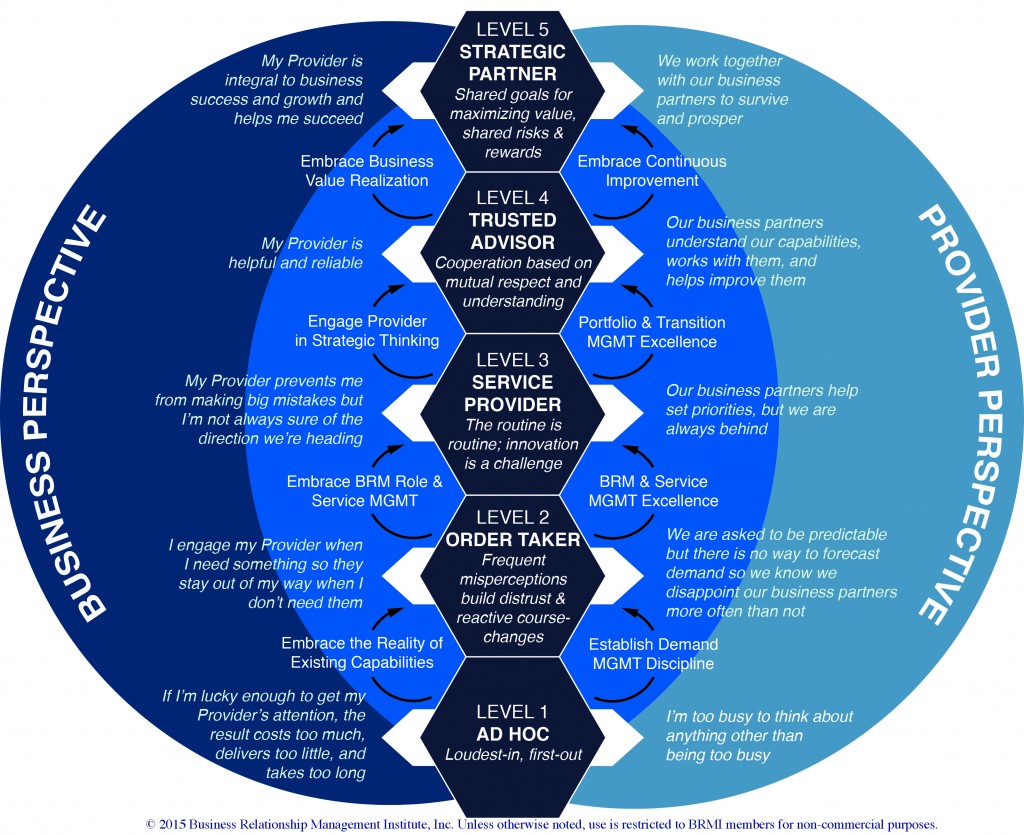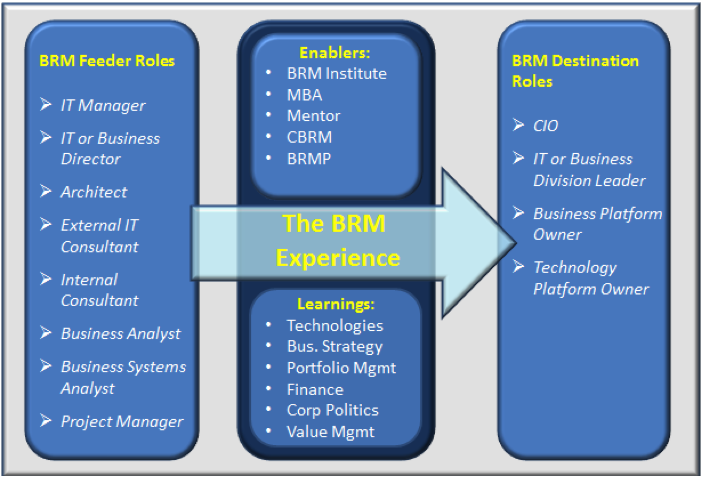BRM Value: What It Means to You and Your Organization
 by Arnie Wetherill
by Arnie Wetherill
When we think about the value of the Business Relationship Manager (BRM) role, what often comes to mind immediately are “Delivering Value” and “Measuring Value.” While these are key aspects of the BRM role, there is another aspect of value that is often overlooked: the value of the role to your organization, and its value to you, as a BRM! This aspect of value is often less visible because it seems to be a given, since your organization has already committed to the role and selected you to deliver it. However, in this article, I’ll focus on how this value is a strategic direction for your organization and directly ties into the reason you were specifically chosen for this role. We’ll come back to “Delivering Value” and “Measuring Value” in future articles.
When you think about it, your organization has made an investment by committing to establishing a BRM capability. Furthermore, as a BRM, you know that in order to make an investment you must first assess its value, whether this means strategic value, monetary value, compliance value, competitive value, or value criteria. No matter what, there must be a clear value-added benefit to rationalize the investment.
So, which value does your organization consider to be the driver for establishing a BRM role?
Many organizations establish the BRM role to obtain the value of its ability to “build a bridge between the Business and the Provider (IT, HR, Finance, etc.), rationalize and shape demand, open transparency, identify emerging opportunities, and realize business value.”
This is absolutely a desired outcome of the BRM role, but is that the total value driving the establishment of a BRM organization? Or are we missing additional value opportunities, otherwise known as value leakage?
To answer this question, let’s look at the six competencies in the “House of BRM” model.
- Strategic Partnering
- Business IQ
- Portfolio Management
- Provider Domain
- Powerful Communications
- Business Transition Management
We’d all agree that these are the necessary competencies for BRM success, but where else do these come into play?
These competencies—developed, matured, and mastered through the BRM experience–not only provides value in the present, but can also pay future dividends by building a talent pool of emerging leaders who are trained and capable of using tools that are necessary for success in executive and technology leadership roles! Since this investment already has a presumed organizational value and assumes a positive value outcome, perhaps this will open up an opportunity for dialogue regarding the relevance of the BRM role within your organization..
So what does this mean for you, the BRM?
There’s yet another investment with a presumed organizational value: the investment in those selected to represent the organization as BRMs! Consider the competencies, strategic relationships, and business experience gained through its practice. While the BRM role can be a ‘destination’ role, your organization will not achieve optimal value from the role if it doesn’t factor your skills into its leadership succession planning.
After all, whether you subscribe to Gartner, Forrester, BRM Institute (Figure 1, below), or any of the major business maturity models, they all support Business-IT Convergence as a necessity to fuel competitive innovation and agility as an organization. With the skill set mastered through the BRM experience, how could your organization not tap into this rich talent pool to leverage these skills towards this aspirational goal?

Figure 1 – BRM Institute Business-Provider Maturity Model
So, what career opportunities does the BRM experience prepare you for and how do you harvest career value from your BRM experience?
As depicted in Figure 2, the skills and experienced gained through the BRM role can position you for both business and technical opportunities, and could help you rise up to Division Leadership, Platform Owner, or even CIO, depending on your starting point and the path you choose to take.

Figure 2 – Career Path Options
Getting there has a lot to do with how you leverage the BRM experience and the additional effort you put into your development. As with each role in your career journey, the BRM role provides an opportunity to gain essential skills that can propel your career forward. However, simply performing the role is no guarantee of success. To optimize your potential, you’ll need to invest in your ongoing development and devise your own career plan to achieve your goals.
Here are some essential enablers to success:
- Adopt internationally recognized standards
Standards exist for a reason; they’re proven best practices, they’re peer-reviewed, and they’re iteratively improved over time. In the BRM world, Business Relationship Management Institute (BRM Institute) is the world leader in establishing internationally recognized standards. Join BRM Institute as a Professional Member
and leverage the vast resources available from the BRMIBoK, member communities, mentoring opportunities, and various conferences to deepen and broaden your skills.
- Obtain industry-recognized, accredited certifications
Accredited certifications demonstrate your competency through recognition by international standards organizations. For the BRM, these include the Business Relationship Management Professional (BRMP) and the Certified Business Relationship Manager (CBRM) certifications. Additional goal-specific certifications may also be useful, such as ITIL, COBIT, and CISSP.
- Seek out mentors
Learning from others who are already in your aspirational career positions is an excellent way of gaining insight and perspective. They can share their experiences and insight about the evolution of the role, as well as provide crucial guidance concerning your development plan.
- Continue your formal education
Formal education provides cross-sectional breadth and opens new ways of thinking from external academic institutions. One of the most accepted methods of gaining this external perspective is through the pursuit of an MBA degree. The pursuit of further education not only provides valid academic experience, but also demonstrates your commitment to lifelong learning.
- Actively pursue related knowledge
This is where career-specific tuning comes in. The pursuit of additional knowledge and experience that is pertinent to your desired path is essential to gaining depth. Through your relationships with executive levels, seek opportunities to gain real-world experience in all facets of the business—finance, portfolio planning, value management, and technology. These are all key elements of business strategy. In addition, developing an understanding of the political milieu and how to traverse it effectively will be critical to your success. Fortunately, these are all aspects of your BRM experience already!
Summary
As BRMs, we constantly focus on value optimization. In this article, we’ve expanded our understanding of value optimization by discussing an often-overlooked aspect of BRM value: the value of the BRM role in organizational leadership succession planning. The competencies, relationships, and political acuity gained through the BRM experience provides an invaluable set of skills that few other roles within an organization can offer. Taking advantage of these opportunities, developing a career plan, investing more deeply in career enablers, and fully exploring the teachings of your BRM experience can empower you to achieve your career goals and provide your organization with a virtually untapped source of future leaders.
Arnie Wetherill is Business Relationship Management Professional (BRMP), a Vice-chair of the BRM Council, and manages a BRM organization for a Fortune 500 company.
Great article Arnie!